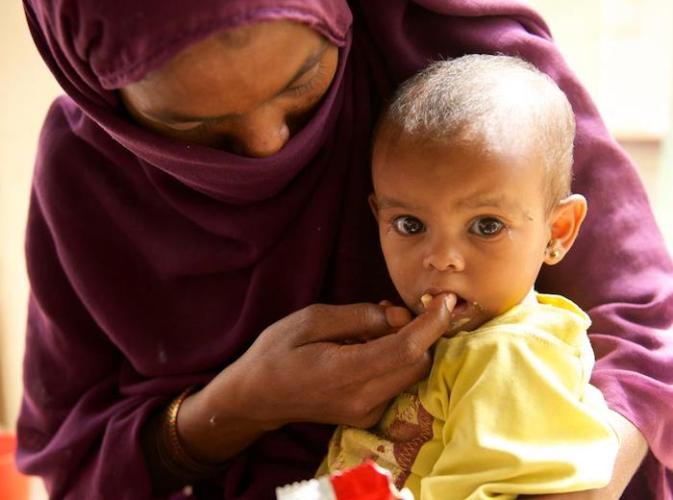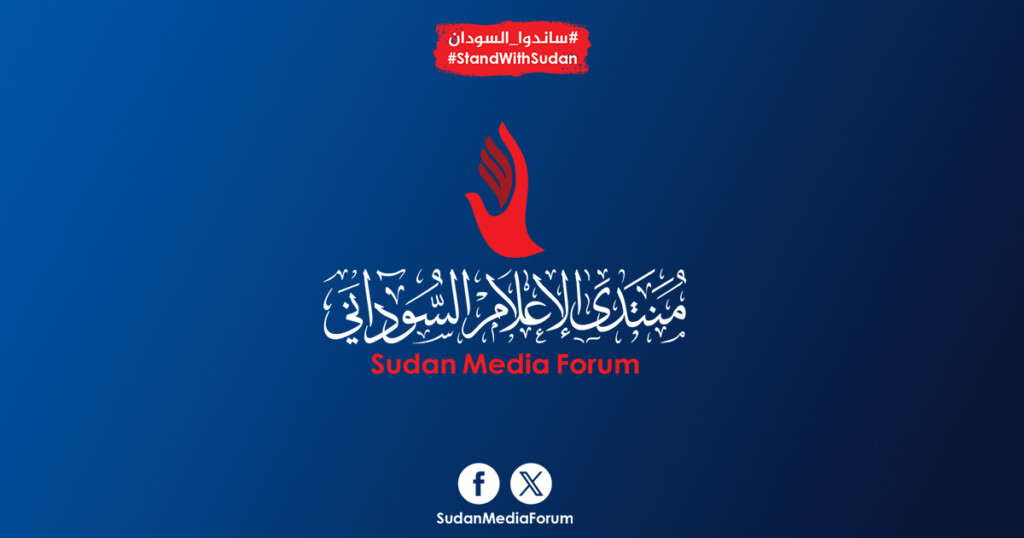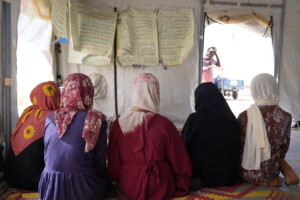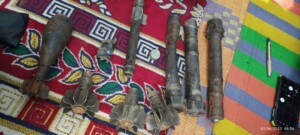Sudan Media Forum: ‘Children die foraging toxic herbs to stave off hunger in South Kordofan’

A mother feeds her one-year-old daughter therapeutic food at a UNICEF-supported nutrition centre in Port Sudan (File photo: Noorani / UNICEF)
Sudan Media Forum Joint Editorial Room – September 29, 2024
Compiled by Radio Dabanga
Food shortages in South Kordofan have reached a critical level, with tragic consequences for families struggling to survive. In Delling, a three-year-old girl died from poisoning after consuming wild plants. Her death came just a week after her three brothers passed away from eating pesticide-treated peanut seeds. The family had been foraging for wild herbs to stave off starvation, a practice that has become widespread across the region.
Children as young as seven are being sent into forests and fields to gather plants, which are boiled to reduce bitterness and mixed with whatever meagre ingredients families can find. However, many children eat the plants before they are properly prepared, leading to fatal poisoning.
In another case, two displaced children, aged 10 and seven, also died in Delling after consuming a toxic herb. Over the past few months, more than 15 people, mostly children, have lost their lives due to consuming poisonous plants in South Kordofan.
At Kadugli Hospital, the effects of this severe food crisis are evident. More than 86 malnourished children are clinging to life in overcrowded wards, with some slowly wasting away, waiting for aid that never arrives.
Many of these children suffer from poisoning caused by eating wild herbs in a desperate attempt to survive. In the general ward alone, over 55 children are receiving treatment, though power outages and a lack of resources have resulted in three children being crammed into a single bed, exacerbating their suffering amid a mosquito infestation.
Activists and local volunteers report that the state is besieged by both conflict and famine, with no humanitarian aid reaching the population. The Sudanese government continues to deny the existence of famine, even as 755,000 people across 10 states, including South Kordofan, face the Integrated Food Security Phase Classification’s Phase 5 famine conditions, the most catastrophic classification according to UN agencies. Meanwhile, 8.5 million people, or 18 per cent of the population, are classified as facing emergency food insecurity.
The Sudan People’s Liberation Movement-North led by Abdelaziz El Hilu (SPLM-N El Hilu), declared famine in its controlled areas in August, citing 109 deaths due to malnutrition across four provinces. Conflict between the SPLM-N, the Sudanese Army, and the paramilitary Rapid Support Forces (RSF) has further aggravated the food crisis, blocking vital supply lines and making the delivery of humanitarian aid nearly impossible.
The ongoing violence, in key areas such as Kadugli and Delling, has restricted access to farming and displaced large numbers of people. Satellite data from NASA and the US Geological Survey indicate that large areas remain uncultivated, with crop yields expected to be well below average due to insecurity, heavy rains, pest infestations, and labour shortages.
In mid-September, Sudan’s leader and Commander-in-Chief of the Sudanese Armed Forces, Lt Gen Abdelfattah El Burhan and South Sudan’s President Salva Kiir agreed to coordinate international efforts to transport humanitarian aid to South Kordofan via Juba.
The SPLM-N welcomed this move, viewing it as a step towards securing relief for the region. However, the SPLM-N has accused the Sudanese government of diverting aid intended for the Nuba Mountains and Blue Nile, using the conflict as a pretext.
Despite these efforts, the situation remains dire. Humanitarian access is still severely restricted, and with the agricultural season in jeopardy, the people of South Kordofan face a worsening food crisis.
This report is also published on the platforms of media and press institutions and organisations that are members of the Sudan Media Forum.
#ساندوا_السودان #StandWithSudan












 and then
and then